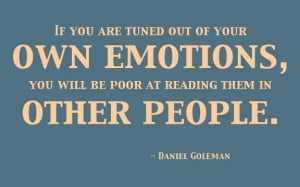On week one, I learned about an introduction to interpersonal communication. It explores about verbal and non-verbal communication and the communication process of how the message is sent and received from another party through a various different communication channel. Going further in depth, I learned about emotional intelligence which is developing strong "People Skills". I find that this topic is intriguing as emotional intelligence skills are the right skills that I need in order to improve my challenges in communication.
From my understanding, emotional intelligence is the key to both personal and professional success. Daniel Goleman define emotional intelligence into five elements which are self-awareness, self-regulation, motivation, empathy and social skills. I believed that people with high IQ do not determine a successful life. Although certainly, a baseline IQ is necessary for effective performance but emotional intelligence may be twice as important as IQ in contributing to excellent and effective performance.
Self-awareness is a core factor that contributes to the improvement of individual performance and development of effective communication and relationship with others. It is important to control one's own emotions and understand the emotions of others which thereafter manifest their emotional intelligence by exercising interpersonal communication skill to communicate effectively, motivate others, resolve conflicts and build teamwork.
I believed that successful people have higher emotional intelligence, hence higher interpersonal communication skill. Emotional intelligence has a positive influence on the implementation of relating well to others and achieving your goals. Emotional intelligence affects the people who you are working with which means that you value others, listening to their wants and needs, and able to empathize with them on many different levels.


No comments:
Post a Comment